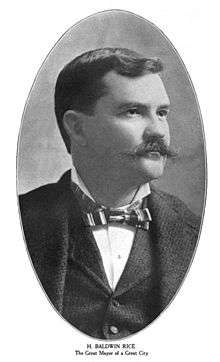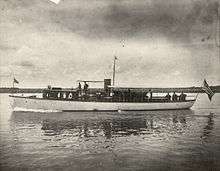Horace Baldwin Rice
Horace Baldwin Rice was a businessman and a mayor of Houston, Texas. He was important in the development of the Houston Ship Channel.
Horace Baldwin Rice | |
|---|---|
 | |
| Mayor of Houston | |
| In office 1896–1898 | |
| Preceded by | John T. Browne |
| Succeeded by | Samuel H. Brashear |
| Mayor of Houston | |
| In office 1905–1913 | |
| Preceded by | Andrew L. Jackson |
| Succeeded by | Ben Campbell |
| Harris County Commissioner | |
| In office 1892–1895 | |
| Personal details | |
| Born | March 29, 1861 Houston, Texas |
| Died | August 2, 1929 (aged 68) Morgan's Point, Texas |
| Spouse(s) | Georgia Dumble |
Personal life
Horace Baldwin Rice was born March 29, 1861, in Houston, Texas, to Captain Frederick Allen Rice and Charlotte M. Baldwin.[1] He was a maternal grandson of Houston mayor, Horace Baldwin and maternal grandnephew of Charlotte Baldwin Allen. He was the paternal nephew of William Marsh Rice, founder and namesake of Rice University.[2][3] He attended the Texas Military Institute in Austin, Texas. He married Georgia Dumble in 1883.[1]
Business and political life

In the early 1910s, Rice was President of Suburban Homestead Company and Vice-President of the Houston Ice and Brewing Company.[1]
In 1905, Rice was the first mayor of Houston under the commission form of government.[1]
Rice used his yacht, the Zeeland, as a tour boat to promote the Houston Ship Channel project. Thomas Ball, himself a central figure in bringing the Houston Ship Channel to fruition, said of Rice, "It is a well known fact that he used the larger part of his fortune in promoting the interests of the city and the Ship Channel."[2] In 1908, Rice called a meeting of Ship Channel supporters to discuss ideas for expediting the project, even suggesting it should the City of Houston should takeover control. The group voted unanimously for Rice's proposal and elected Ball to take lead over this plan.[4]
In January 1909, Rice appointed a committee representing the City of Houston to collaborate with leaders from Beaumont, Texas, who were lobbying Congress for a navigation district. Congress passed a bill that allowed the creation of navigation districts not just for Beaumont, but also for other Texas cities, each contingent on local referendum. In December 1909, Rice led a local delegation to lobby the House Rivers and Harbors Committee for a fifty percent federal grant to support the Houston Ship Channel project.[5]
Harris County sponsored a ballot measure to create the Harris County Houston Ship Channel Navigation District and bonding authority for $1.25 million. On election day, January 10, 1911, Rice declared that businesses close early to allow voters to get to the polls.[6]
References
- Johnson, Frank (1914). A History of Texas and Texans, Volume 4. Chicago: American Historical Society. p. 121.
- Sibley, Marilyn McAdams (1968). The Port of Houston: a history. Austin, Texas: University of Texas Press. p. 133.
- Hall, Randal L. (ed.) (2012). William Marsh Rice and His Institute: The Centennial Edition. Houston: Rice University. p. 171n. ISBN 978-1-60344-688-4.CS1 maint: extra text: authors list (link)
- Sibley (1968), p. 134.
- Sibley (1968), p. 134–135.
- Sibley (1968), p. 136.
External links
| Preceded by Andrew L. Jackson |
Mayor of Houston, Texas 1905–1913 |
Succeeded by Ben Campbell |
| Preceded by John T. Browne |
Mayor of Houston, Texas 1896–1898 |
Succeeded by Samuel H. Brashear |